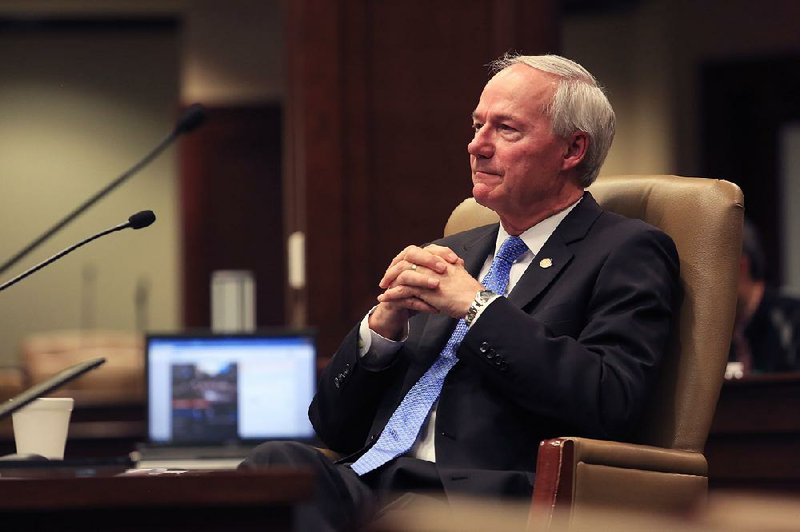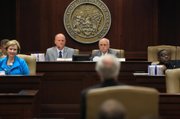A legislative task force on Wednesday unanimously endorsed Gov. Asa Hutchinson's plan to seek federal approval for changes to the private option, including charging premiums to certain enrollees and requiring job training for those who are unemployed.
As part of the same vote, the Health Reform Legislative Task Force approved Hutchinson's plan to seek $835 million in cuts from the traditional Medicaid program over five years.
Addressing the task force before the vote, Hutchinson indicated that he expects the cuts to come primarily from payments for services to patients with expensive medical needs, such as nursing-home residents, the developmentally disabled and the mentally ill.
Although those who provide those services generally oppose hiring managed-care companies to cut costs, Hutchinson said he remains open to that option if the providers don't present credible alternatives.
"That is a battle that is faced down the road as to how we're going to achieve those savings," Hutchinson told the task force. "If we can't reach an agreement, we might have to have some very tough votes on that."
The governor said he will develop a concept paper on the proposed changes to the Medicaid program and will begin discussions with U.S. Health and Human Services Secretary Sylvia Burwell in January.
The final details of the revamped program would then go back to the task force for approval and to the Legislature during a special session that Hutchinson will call in April.
The proposal would then be sent to the Health and Human Services Department's Centers for Medicare and Medicaid Services for approval.
The Legislature created the 17-member task force earlier this year at Hutchinson's request to recommend changes to the state's Medicaid program, including a program to replace the private option after the federal waiver authorizing it expires on Dec. 31, 2016.
Under the private option, the state uses Medicaid funds to buy coverage on the federally run health insurance exchange for almost 199,000 low-income Arkansans.
The Legislature created the program in 2013 as a primary way of extending Medicaid coverage to adults with incomes of up to 138 percent of the poverty level: $16,243 for an individual, for instance, or $33,465 for a family of four.
For the state to continue providing the expanded coverage, Hutchinson has said, he wants to see changes that would encourage personal responsibility and employment among enrollees and strengthen procedures for verifying enrollees' eligibility.
Now officially known as the Health Care Independence Program, the revamped private option would be called Arkansas Works.
Hutchinson has said he also wants to cut the state's Medicaid spending by at least $50 million annually -- enough to ensure the state has enough money to pay its share of the private option's cost in 2020, when the state will be responsible for 10 percent of the expense.
According to estimates by a consultant to the state Department of Human Services, the remainder of the state's $200 million share of the cost is expected to come from increased premium tax revenue, reduced spending in the traditional Medicaid program and a reduction in the cost of providing medical care to the uninsured.
Hutchinson told the task force Wednesday that he will seek federal approval to:
• Subsidize coverage through employer plans, instead of through the private option, for those with access to job-based coverage, which he said could save up to $29 million a year.
• Require recipients with incomes above the poverty level to pay premiums of up to 2 percent of their incomes and possibly require contributions by recipients earning as little as half the poverty level. The premiums could be waived for enrollees who meet wellness requirements.
• Offer enhanced coverage options for participants who meet certain program requirements.
• Require referrals to job-training programs for unemployed enrollees.
• Stop providing reimbursement for medical expenses incurred up to 90 days before an enrollee applies for coverage. Instead, the coverage should start on the day of enrollment, Hutchinson said.
• Exclude from coverage or charge higher premiums to Arkansans who own substantial assets, such as a house worth $200,000 or more or cash-equivalent assets of at least $50,000.
Imposing such an asset test likely would not be allowed by President Barack Obama's administration, Hutchinson told the task force, adding that it is an idea the state could raise now and possibly pursue when a new president takes office in 2017.
At a conference of Medicaid providers last week, Hutchinson said he also wanted to impose "lockout" periods for enrollees who fail to pay premiums.
But in his remarks to lawmakers on Wednesday, Hutchinson didn't mention the idea, which was recommended by The Stephen Group, a consulting firm hired by the task force.
"Accountability is important, but it has to be accountability that is workable and does not increase the uncompensated care for our hospitals or increase cost to the state from an administrative standpoint," Hutchinson said.
He told reporters later that some legislators had expressed concerns about the lockout idea and that he had pledged to "work through what is the right accountability for these type of premium requirements."
The term lockout "does not really describe what we need to do as a state," Hutchinson said, adding, "I've always said incentives are better than punitive measures."
Hutchinson also told legislators that the state should consider using its small-business health exchange to encourage more employers to offer insurance and imposing a time limit on coverage for enrollees who fail to follow the program's work requirements.
Like the asset test, however, imposing such a time limit likely wouldn't be allowed by the current U.S. administration, he said.
Managed care
Because the federal government pays about 70 percent of the cost of the traditional Medicaid program, reducing state spending by $50 million annually means reducing overall Medicaid spending by about $167 million a year, or $835 million over five years.
In a letter to legislators in October, Hutchinson said he agreed with The Stephen Group that the state should hire managed-care companies to reduce the state's Medicaid spending, but only for "high-cost populations" and with "clear goals and effective oversight by the state."
On Wednesday, he said nursing homes and other long-term-care providers have proposed a plan to reduce costs by $250 million over five years -- without turning to managed care.
That plan, he said, includes conducting an independent assessment of each patient annually, implementing "tiers of care" for patients who do not require institutional care, and "a smart re-balancing between home care and institutional care."
Similarly, he said, proposals by provider groups would reduce dental spending by $20 million over five years and pharmacy costs by $110 million over the same period.
He also wants to reduce spending on mental health by $231 million over five years and on the developmentally disabled by about $232 million, but he said provider groups have yet to present credible plans to achieve cuts in those areas without hiring managed-care companies.
"Any path to get to those savings has to be credible, has to be measured, has to be independently confirmed," Hutchinson said.
Hutchinson spokesman J.R. Davis said in an email after the meeting that the target reductions in spending on the mentally ill and developmentally disabled were based on The Stephen Group's "recommendation on managed care, based on the success of other states."
But John Stephen, the consulting firm's managing partner, said after the meeting that he didn't know where Hutchinson's cost-reduction targets came from.
In the firm's report to the task force in October, it estimated that "re-balancing" the state's spending away from nursing homes and toward home-based care could save $504 million from 2017 through 2021.
In the same report, the firm said Arkansas could save $2.4 billion in state and federal funds between 2017 and 2021 by hiring managed-care companies to pay for services for the entire traditional Medicaid program.
Over the same period, the state could save almost $2 billion by hiring such companies only for the high-cost recipients, such as nursing-home residents, the disabled and the mentally ill, according to the firm.
If the state implements its own payment changes without hiring managed-care companies, the state could save $708 million, the firm said in its report.
At the request of Sen. Linda Chesterfield, D-Little Rock, the task force on Wednesday asked The Stephen Group to develop a plan that would meet Hutchinson's cost-cutting goal while hiring managed-care companies solely to provide dental benefits.
Sen. Jim Hendren, R-Sulphur Springs and a chairman of the task force, said after the meeting that he's open to alternatives that don't involve managed care but was skeptical that they could achieve the same results.
"There's probably a reason why 35 or 40 states are going to managed care," he said.
A Section on 12/17/2015

